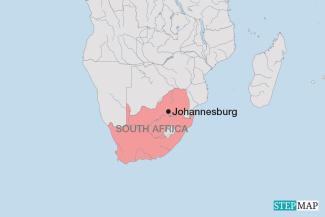Undocumented immigrants
Immigrants trapped in illegality

South Africa is cracking down on illegal gold mining and undocumented refugees, even deploying the army. Clerics and worshippers say their conscience is torn between shunning illegal mining and seeing their churches impoverished. “It’s a tough call but I’ll be honest,” says Samson Bhureki, a refugee cleric. “Our evangelical church here in Johannesburg is composed of 200 worshippers, all undocumented refugees, 80 % who survive as illegal gold ore miners including me. This money keeps our church flowing.”
Johannesburg is known worldwide as the “City of Gold” because it is the site of the world’s 20th-century richest gold find. Here, hundreds of thousands of undocumented immigrants from Zimbabwe and Mozambique live and run informal, open-air churches funded by the earnings they scrap from going down in old derelict mines. They sell the gold they mine at the vast South African black market.
“This is who we are, we are not ashamed though we know perhaps illegal gold mining may be ungodly because the Bible says we must obey earthly laws. We spent two weeks under old, creaking gold mines to extract ore thus funding our families and churches,” Pastor Bhureki says candidly.
“But lately, police in South Africa are hostile against undocumented immigrants. They say we are the kingpins of the illegal gold trade. They sometimes disrupt our open-air church services to conduct arrests and deportations. We are just poor Christians, undocumented immigrants, digging for scrap gold ore to buy food for our families, take children to school, cater for healthcare, and donate to our churches.”
According to Bhureki, hostility to immigrants in South Africa is rising not only among locals but also among law-enforcement agents who accuse refugees of snatching jobs. Pastor Killian Moyo, an immigrant from Mozambique who has stayed in South Africa for 10 years, blames xenophobia for pushing the immigrants into illicit activities.
The immigrants are not safe in South Africa. Their reputation for gold mining makes them a target for armed robbers. The informal churches, which provide an opportunity for exercising their freedom of worship and networking, are regularly raided by crime gangs. “On the other hand, such informal churches guarantee freedom of worship. However, it makes them magnets for armed robberies,” Moyo says.
In October 2023, a guest cleric-pastor, Dwayne Gordon, was brutally assassinated during a Sunday church service in Johannesburg. The attack highlighted the eminent threat against places of worship in the country. Now, religious groups are calling for enhanced protection. The religious people want protection and permission to be armed with pistols, bulletproof vests and rifles.
Churches and mosques are the new targets for armed criminals in South Africa – based on the assumption that churches and mosques are easy, undefended spots to scoop tithe money, and congregants’ cell phones, cars, jewellery and lavish cash donations from abroad. “If it can happen to a registered church inside a proper building, imagine what will happen to informal immigrant churches that gather in the open,” Moyo says.
Nyasha Bhobo is a freelance journalist from South Africa.
nyashabhobo@gmail.com














